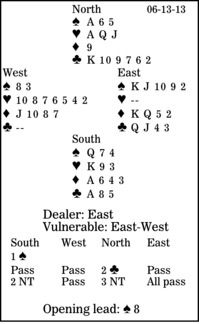Bridge column, June 13: Do not jump to beginnings

Bridge deals, though, are about all of the tricks, the beginning, middle and end. One must be careful about jumping to conclusions at the beginning.
In this deal, how should South play in three no-trump after West leads the spade eight?
When North balances with two clubs, he may bid a couple of points lighter than he would have needed in second position. So when South advances, he should add a couple of points for his actions -- hence two no-trump, not three no-trump. But North, because he has a full-weight overcall, raises.
Declarer starts with seven top tricks: one spade, three hearts, one diamond and two clubs. Obviously, the clubs will provide several extra winners. Also, because the spade queen can be established immediately, it looks natural for declarer to play low from the board at trick one.
However, that could be fatal. East can win with his spade king and shift to diamonds. Then, when he gets in with his club trick, the defenders run the diamonds. (Yes, if South first cashes his major-suit winners, East will have to unblock diamonds, keeping a low card, but West's carding should have made it clear to do that.)
Instead, declarer should take the first trick with dummy's spade ace and play a low club, covering East's card as cheaply as possible to allow for a 4-0 split. Here, he wins with his five and must take at least 10 tricks.
** ** **
COPYRIGHT: 2013, UNITED FEATURE SYNDICATE
DISTRIBUTED BY UNIVERSAL UCLICK FOR UFS

